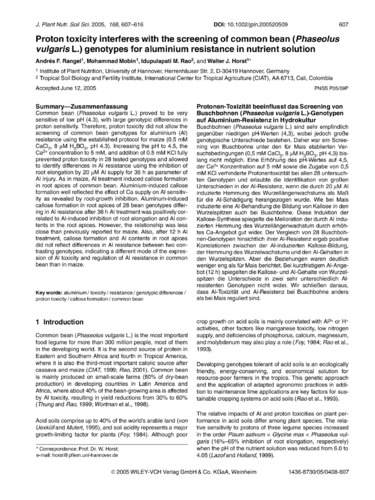Proton toxicity interferes with the screening of common bean (Phaseolus vulgaris L.) genotypes for aluminium resistance in nutrient solution
Common bean (Phaseolus vulgaris L.) proved to be very sensitive of low pH (4.3), with large genotypic differences in proton sensitivity. Therefore, proton toxicity did not allow the screening of common bean genotypes for aluminium (Al) resistance using the established protocol for maize (0.5 mM CaCl2, 8 ?M H3BO3, pH 4.3). Increasing the pH to 4.5, the Ca2+ concentration to 5 mM, and addition of 0.5 mM KCl fully prevented proton toxicity in 28 tested genotypes and allowed to identify differences in Al resistance using the inhibition of root elongation by 20 ?M Al supply for 36 h as parameter of Al injury. As in maize, Al treatment induced callose formation in root apices of common bean. Aluminium-induced callose formation well reflected the effect of Ca supply on Al sensitivity as revealed by root-growth inhibition. Aluminum-induced callose formation in root apices of 28 bean genotypes differing in Al resistance after 36 h Al treatment was positively correlated to Al-induced inhibition of root elongation and Al contents in the root apices. However, the relationship was less close than previously reported for maize. Also, after 12 h Al treatment, callose formation and Al contents in root apices did not reflect differences in Al resistance between two contrasting genotypes, indicating a different mode of the expression of Al toxicity and regulation of Al resistance in common bean than in maize.

